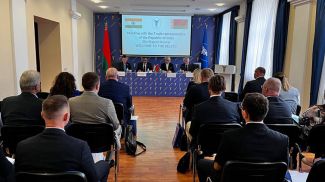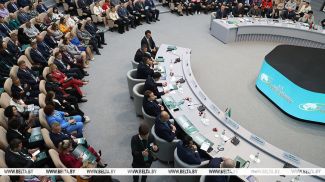MINSK, 27 February (BelTA) - The EU twinning project “Strengthening the National Bank of Belarus” was officially launched in Minsk on 27 February, BelTA has learned.
“We are honored to be the first Belarusian government institution to start Twinning. We are aware of the complexity and the magnitude of the project and intend to approach its implementation in the most professional, responsible way. Today's event is a necessary starting point in the implementation of the project, which was preceded by a long preparatory work,” Deputy Chairman of the Board of the National Bank of Belarus Sergei Kalechits said during the ceremony.
The project will be implemented by the National Bank together with a consortium of European banks: the German Federal Bank, the National Bank of Poland and the Bank of Lithuania in 2018-2019. The partner banks will share their best practices, promote the central bank's modern methods and procedures in Belarus. The budget of the project is €1.15 million. The project involves six components: payment systems, financial stability, banking supervision, financial risk management, the protection of consumers of financial services, information policy.
Sergei Kalechits stressed that the joint implementation of the project will help reach a qualitatively new level and strengthen the capacity of the National Bank as a regulator and supervisory authority by getting closer to the standards of the central banks of the EU. “Applying the best practices of the partner banks will contribute to the stability of the Belarusian banking system and monetary sector in general. The National Bank plans to work with the partners to strengthen the expertise and practical potential in such a priority area as a payment market. Work in this area will be focused on a bill on payment services, which is being developed in harmonization with the EU legislation,” he said. The adoption of this law will modernize the Belarusian financial market and create a legal basis for the integration of Belarus' payment system with the payment systems of the European Union countries.
The EU Twinning Project will help study the legal and institutional environment to secure financial stability in Belarus and develop recommendations on its improvement in the light of the best international practices (responsibility, division of powers, regulatory activity). The project also envisages improvements to the report on financial stability, including the regulation of its preparatory process, the development of a reference guide for internal use on financial stability monitoring, strengthening of the personnel potential through trainings on the use of the improved macroprudential supervision system.
Speaking about the protection of consumers of financial services, Sergei Kalechits said that as part of the project the National Bank plans to work out practical measures to improve the system of protection of rights and legal interests of consumers of such services, including the institution of the financial ombudsman. The efforts will be focused on enhancing the efficiency of the protection of the violated rights of the consumers of services, individuals, during banking operations and leasing activity conducted by banks and non-banking credit and financial organizations and also the violated rights of consumers by microfinancial organizations and forex companies.
As for the component on banking supervision, there are plans to introduce the best international practices of carrying out the supervisory evaluation process based on the standards of the Basel Committee. “A positive effect is expected from the improvement of the early warning system aimed at identifying potential problems of banks at an early stage. This will allow taking proactive supervisory measures,” the deputy chairman said.
According to Sergei Kalechits, an action plan has been developed for the implementation of the Twinning project for all six components. “I am sure that our experience will be positive, and I hope that soon enough other government bodies will be able to launch new Twinning projects with their European counterparts,” he said.












